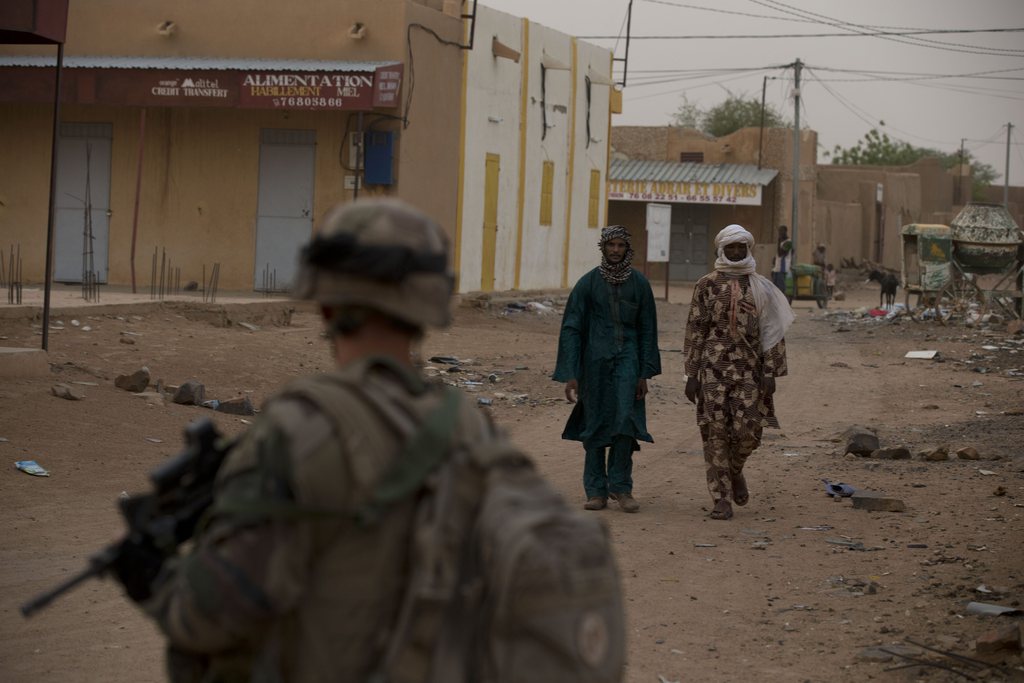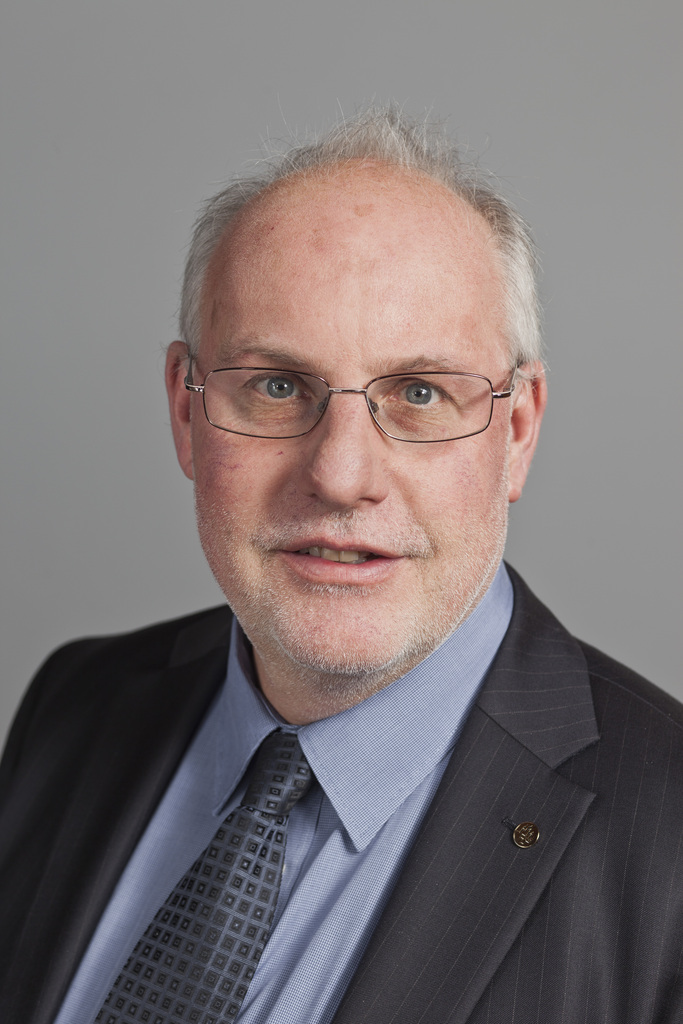
‘The problems in Mali are nowhere near being solved’

Two French journalists were murdered in Kidal, Mali, just as Switzerland’s new special envoy to the region was arriving to start his first mission. He says Bern remains committed to bringing peace to this troubled land despite criticism of the Swiss in Mali.
Didier Berberat, a senator from canton Neuchatel, was appointed by the cabinet last October to take over the post of special envoy to the Sahel region from ambassador Gerard Stoudmann. And, Berberat is now representing Switzerland on the International Follow-up and Evaluation Committee tasked with resolving the crisis in Mali. From November 3-10, he travelled to Burkina Faso and Mali, where Switzerland is acting as a mediator.
Born on December 1, 1956, in La Chaux-de-Fonds, canton Neuchatel, Didier Berberat was trained in law and has sat in parliament for 18 years. He is a member of the Social Democratic party.
He is also currently president of the Senate’s Committee for the Environment, Spatial Planning and Energy, as well as president of the Swiss delegation to EFTA and the European Parliament.
Berberat, who is also a member of the Parliamentary Assembly of the Francophonie, was recently named by the Federal Department of Foreign Affairs as Swiss special envoy to the Sahel region, a part-time position.
swissinfo.ch: The murder of two French journalists from Radio France International in Kidal on November 2 shows that northern Mali is anything but peaceful. Can you really work to achieve peace in such a volatile situation?
Didier Berberat: This tragic incident was of course the subject of discussions that I had when I met with ministers and political figures in Burkina Faso and Mali. Everyone is aware of the fact that the problems are nowhere near being solved. It’s going to take time to resolve this crisis.
Switzerland is in fact working on finding a durable solution to the Malian crisis. We’re making sure that the core issues are dealt with so that these types of incidents never happen again. In this context, improving the living conditions of the local population, offering them better access to health care and training, and developing the communication infrastructure of this vast country – these things are also vital.

More
Swiss step up peace involvement in Mali
swissinfo.ch: In what tangible ways can you be helpful?
D.B.: My job consists primarily of handling these issues within the International Follow-up and Evaluation Committee that was part of the agreement signed on June 18 in Ouagadougou; the truce provided for a ceasefire between the warring parties and paves the way for an end to the crisis. Switzerland has had a presence in the region for close to 40 years, and has close ties of friendship and cooperation with Mali.
That’s why the country got involved in the UN-backed peace process in Mali back in January 2012, following a request from the government in Bamako, the armed groups involved in the negotiations, and the Economic Community of West African States (ECOWAS).
On a more personal level, I have contacts in the region, mainly through my work with the Parliamentary Assembly of the Francophonie. By appointing a parliamentarian, the Federal Department of Foreign Affairs wanted to send a signal to our partners that it’s serious about finding a solution to the Malian crisis.

swissinfo.ch: A little more than a year ago, Switzerland was really taken to task by some Malian politicians, who accused the country of funding the Tuareg rebellion and indirectly financing terrorist groups. Is that animosity still there?
D.B.: In general, Switzerland’s role has been very well received by Malians. But we can’t overlook the difficulties of last summer, when a segment of the Malian media led a scathing campaign of criticism against our country. But since then, things have calmed down. We have explained to our contacts that Switzerland has never given support to the armed groups; it only acted as a mediator in Burkina Faso on behalf of ECOWAS and the UN.
If there was any kind of technical support, it was purely to prepare the negotiations and reach an agreement, which was finally signed on June 18 in Ouagadougou, thanks in particular to the active role that Switzerland played. Our single objective is to promote a return to peace and harmony in Mali.
swissinfo.ch: But won’t peace in Mali and the region be achieved solely by granting greater autonomy to the Tuareg?
D.B.: Obviously, at the negotiating table, the different parties have to see some signs of progress. The different armed groups from northern Mali that are engaged in discussions – and not just the Tuareg – must be able to voice their demands within the framework of the peace process. We’ll find durable solutions only when we take into account the expectations of all the local people.
Mali is among the priority countries of the Swiss Agency for Development and Cooperation (SDC), which has had a presence in the West African nation for nearly 40 years. Last year, the agency allocated CHF20 million ($21.8 million) to Mali, with the aim of improving food security, education, professional training and local governance. Following the 2012 Islamic insurgency in the north of the country, the SDC moved its operations to the region of Sikasso in the south.
Switzerland acted as a facilitator during the negotiations that paved the way for presidential elections in August. It holds a seat on the International Follow-up and Evaluation Committee created under the Ouagadougou accord, which was signed by the Malian government and the Tuareg rebel groups, MNLA and HCUA.
Last August, the cabinet opted to send up to eight unarmed soldiers to join the UN Mission in Mali (MINUSMA). Their role will be largely restricted to de-mining operations.
swissinfo.ch: Has Switzerland not overstepped its bounds in the Malian crisis?
D.B.: No. These mediation efforts fall perfectly within the political framework of promoting peace, and of the humanitarian and diplomatic tradition of Switzerland. The constitutional and legal framework has been respected, together with the balance of action that Switzerland has taken in Mali.
Some people in Switzerland are not in favour of the principle of an active diplomacy and would prefer that we mostly take care of internal problems. But in this globalised world, we cannot remain on the sidelines when conflicts and crises erupt; on the contrary, it is essential that we offer our know-how to help resolve them.
swissinfo.ch: Faced with the interests of the great powers that are present in the region, does Switzerland’s voice really matter?
D.B.: Switzerland is a neutral country with no colonial past, strategic interests or a hidden political agenda in Africa. That’s why we have been asked to help find a solution to this crisis. Based on what people have been telling me, the support given by Switzerland is very important.
Moreover, our development cooperation activities are closely tied to the
current process of dialogue and reconciliation. Switzerland can, for instance, bring its relevant experience with decentralisation to the table, and that’s something that could contribute to the end of the crisis in Mali.
(Translated from French by Geraldine Wong Sak Hoi)

In compliance with the JTI standards
More: SWI swissinfo.ch certified by the Journalism Trust Initiative

















![The four-metre-long painting "Sonntag der Bergbauern" [Sunday of the Mountain Farmers, 1923-24/26] had to be removed by a crane from the German Chancellery in Berlin for the exhibition in Bern.](https://www.swissinfo.ch/content/wp-content/uploads/sites/13/2025/12/01_Pressebild_KirchnerxKirchner.jpg?ver=8f77363a)












You can find an overview of ongoing debates with our journalists here . Please join us!
If you want to start a conversation about a topic raised in this article or want to report factual errors, email us at english@swissinfo.ch.